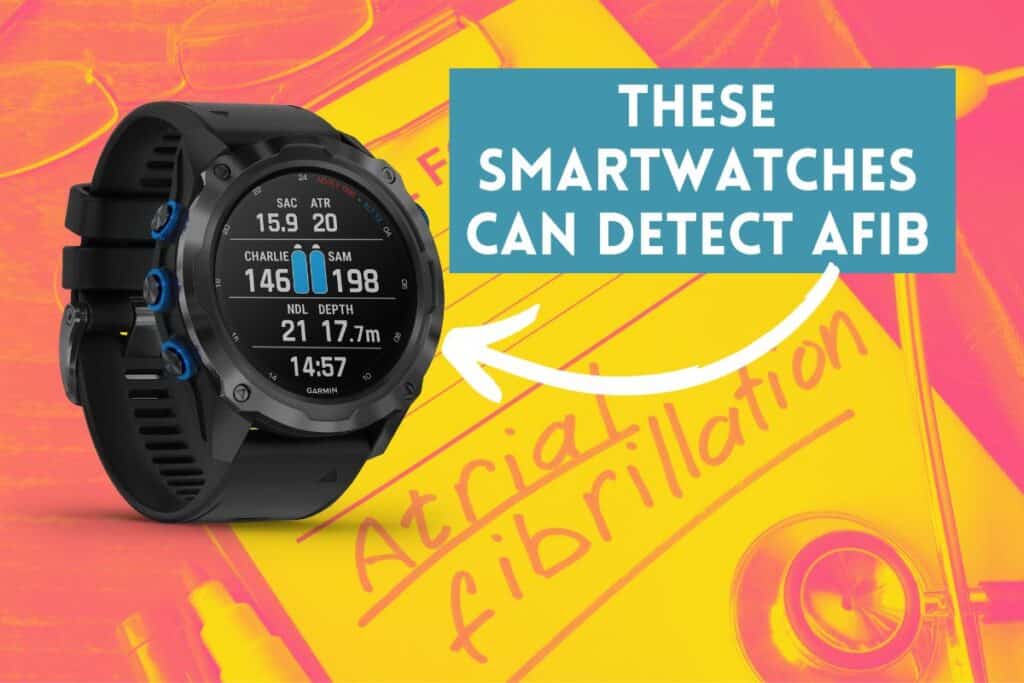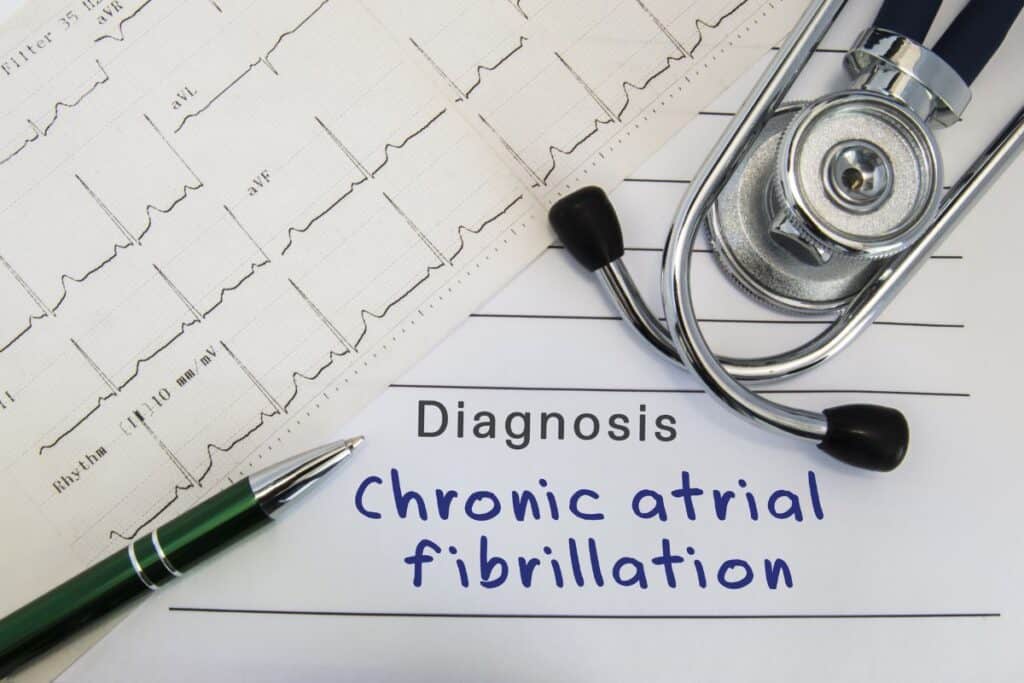Here’s Which Smartwatches Can Detect Afib (Must Read!)
AFIB is a problematic heart condition that may be detected earlier with the right smartwatch. So which smartwatches can detect AFIB?

Key Lessons From This Article
- There are a lot of different smartwatches on the market, and not all of them are created equal. Do your research and read reviews to find a reliable watch.
- Samsung, Apple, and Fitbit make watches that can detect AFIB.
- Remember that these readings are just estimates. If your watch shows you something, you should see your doctor immediately.
Some of the best watches for detecting Atrial fibrillation, or AFIB, include Apple Watch Series 7, Samsung Galaxy Watch 4, Fitbit Sense, Withings ScanWatch, and Fitbit Charge 5.
We have been using smartwatches for a long time and can vouch for their health benefits. Here, we will talk about some smartwatches that can detect AFIB.
What Is AFIB?
Atrial fibrillation, or AFIB, is a heart condition that causes an irregular and often rapid heart rate. The heart may beat erratically, in a fast and fluttery manner, or it may beat too hard and too fast.
Atrial fibrillation is the most common type of arrhythmia or irregular heartbeat. Although it can occur in people of any age, it is more common in older adults. In most cases, atrial fibrillation is not life-threatening but can lead to serious complications like strokes.
Treatment for atrial fibrillation typically focuses on managing symptoms and preventing strokes. Some people with atrial fibrillation may also need medication to restore a normal heart rhythm.
Surgery may sometimes be necessary to correct the condition’s underlying cause. With proper treatment, many people with atrial fibrillation can live long and healthy lives.
Recommended Reading: Can Garmin Detect An Irregular Heartbeat?
AFIB Symptoms
If you experience chest pain, dizziness, fatigue, lightheartedness, weakness, shortness of breath, or AFIB symptoms, it is important to seek medical attention immediately.
These symptoms could indicate a serious health condition, such as a heart attack or stroke. While chest pain is the most common symptom of a heart attack, it is important to remember that not all heart attacks produce chest pain.
In fact, many people who experience a heart attack report having little to no chest pain at all. This is why it is important to be aware of all the potential heart attack symptoms and seek medical attention if you experience any of them.
AFIB symptoms, in particular, should never be ignored as they can indicate an impending stroke.
If you experience any of the aforementioned symptoms, please don’t hesitate to seek medical attention. It could save your life.
Is It Common?
By 2030, the number of Americans with atrial fibrillation (AFIB) is expected to reach a staggering 12.1 million—a nearly 50% increase from 8.1 million in 2010.
AFIB is currently the most common type of abnormal heart rhythm and affects people of all ages.
It occurs when the heart’s upper chambers (the atria) quiver or beat too fast, out of sync with the lower chambers (the ventricles). This can cause reduced blood flow to the body and lead to several serious complications, including stroke.
While AFIB can often be managed with medication, some people may require surgery to correct the problem.
With the aging of the population and the increased prevalence of risk factors such as obesity and diabetes, the number of people living with AFIB is expected to continue to rise in the coming years.

Stage of AFIB
First Stage AFIB
Paroxysmal AFIB is the first stage of AFIB. Short episodes of irregular heartbeats characterize it. During these episodes, the heart may beat too fast, too slow, or erratically.
Paroxysmal AFIB can last for a few seconds or minutes and may occur several times a day or once a week.
Although the episodes are brief, they can be disruptive and cause symptoms such as heart palpitations, fatigue, and shortness of breath.
While paroxysmal AFIB does not usually lead to serious complications, it can be a precursor to more serious forms of AFIB. Therefore, it is important to see a doctor if you experience any symptoms of paroxysmal AFIB.
Second Stage AFIB
Persistent AFIB is the second stage of AFIB. In this stage, the heart rhythms are irregular most of the time. You may have symptoms all the time or only some of the time.
You may have periods when your heart returns to a normal rhythm (sinus rhythm). Persistent AFIB can last for weeks, months, or years.
It may come and go. You’re more likely to have persistent AFIB symptoms than paroxysmal AFIB. And you’re at risk for having a stroke with persistent AFIB. That’s because the blood doesn’t flow as well when your heart isn’t pumping regularly.
Over time, this can lead to a blood clot in your heart. If a clot breaks loose, it can travel to your brain and cause a stroke.
That’s why it’s important to see your doctor if you have any symptoms of AFIB. He or she can treat you and help prevent a stroke.
Third Stage AFIB
This is when the heart no longer returns to its normal sinus rhythm on its own, and medical intervention is required to restore a normal heart rhythm.
A number of factors, including underlying heart disease, excessive alcohol consumption, and certain medications, can cause permanent AFIB.
Permanent AFIB can be very dangerous and even life-threatening if not treated promptly. If you think you may be experiencing Permanent AFIB, it is important to seek medical help right away.
Permanent AFIB can be treated with medications, electrical cardioversion, or surgery. The treatment that is right for you will depend on the underlying cause of your Permanent AFIB and the severity of your symptoms.
Permanent AFIB can be a serious condition, but with prompt treatment, many people are able to live long and healthy lives.

Best Watches for Detecting AFIB
Apple Watch Series 7
The Apple Watch Series 7 is the latest release from Apple, and it is packed with new features and improvements.
One of the most impressive new features is the ability to detect Atrial Fibrillation (AFib), a type of irregular heartbeat that can lead to stroke or other serious health complications.
Apple has been working with researchers and clinicians to develop this feature, and the results are very promising.
In a clinical study, Apple Watch could accurately detect AFib in more than 98% of participants. This is a significant improvement over previous generations of Apple Watch, which were only able to detect AFib in around 85% of participants.
Apple Watch Series 7 is an incredible tool for people who are at risk for AFib, and it has the potential to save lives.
Samsung Galaxy Watch 4
The Samsung Galaxy Watch 4 is a smartwatch that was released in 2020. It is available in two sizes, 41mm and 45mm.
The watch has many features, including tracking fitness and sleep, taking phone calls and sending messages.
One of the most touted features of the Samsung Galaxy Watch 4 is its ability to detect atrial fibrillation (AFib). AFib is a type of heart arrhythmia that can lead to stroke or other serious health complications.
Samsung’s watch uses sensors to detect irregular heartbeats and then sends a notification to the user if it detects AFib.
The detection of AFib is not perfect, but Samsung’s watch is one of the most accurate devices on the market.
In addition, Samsung’s watch also has features that make it easy to manage AFib once it has been detected.
Overall, the Samsung Galaxy Watch 4 is an excellent choice for anyone looking for a smartwatch with advanced features.
Fitbit Sense
The Fitbit Sense is Fitbit’s most advanced smartwatch yet. It has various features designed to track your health and fitness, including the ability to detect AFib (atrial fibrillation).
While Fitbit’s smartwatches have always been good at tracking heart rate, the Fitbit sense takes things a step further by using an electrocardiogram (ECG) to detect irregular heartbeats that could be indicative of AFib.
While Fitbit’s previous smartwatches could only provide an estimate of your resting heart rate, the Fitbit sense provides a more accurate picture of your overall heart health.
In addition to its improved heart health tracking capabilities, the Fitbit sense also offers other features like sleep tracking, stress monitoring, and breathing exercises. If you’re looking for a Fitbit that can do it all, the Fitbit sense is the best option.
Fitbit Charge 5
It is a fitness tracker with many functions, one of which is detecting atrial fibrillation (AFib). Fitbit devices are worn on the wrist and track data such as heart rate, steps taken, and calories burned.
The Fitbit Charge 5 uses sensors to detect irregular heartbeats and then sends this information to the Fitbit app, where a doctor can interpret it.
While Fitbit devices are not intended to be used as a medical diagnostics tool, they can provide valuable information to doctors, who can then make treatment decisions. In general, Fitbit devices are considered to be accurate for tracking AFib.
However, as with all wearable fitness devices, there is always some margin of error. If you may have AFib, it is important to consult a doctor to get a definitive diagnosis.
Withings ScanWatch
Withings ScanWatch is a smartwatch that has been specifically designed to help detect AFib. It uses an optical sensor to measure heart rate and look for irregularities that could indicate AFib.
The watch also has an ECG sensor that can be used to confirm the presence of AFib. Withings ScanWatch is one of the most accurate smartwatches for detecting AFib, with a detection rate of 97%.
This means that it can be a useful tool for people who are at risk of AFib or who have already been diagnosed with the condition.
